The Night the Guns of War Fell Silent and the Carnage Stopped
Wars suppress the natural urge of men to behave in a manner that has no bearing to and can even remotely be construed as civilized behavior. Anytime, anywhere, when the cycle of violence is momentarily interrupted or broken, that, in itself, is worthy of remembrance. Even in the midst of unprecedented carnage in World War I, soldiers on both sides found within themselves a modicum of human decency and desire for peace. In this most brutal of wars which raged on for four long years, there was a cessation of hostilities on the night of December 24, 1914 - even if for only one day.
"Theirs Not to Reason Why, Theirs But to Do and Die"

Combat does terrible things to human beings and transforms the best of them into killing machines. The low-key and gentle man who may have been a country farmer in a previous life turns into a savage, thirsty for blood. The unassuming and quiet factory worker who was primarily concerned with making machine parts emerges as an efficient killer. The seemingly peace-loving gardener who lovingly took care of nature's wonders is worried about one and only one thing: kill or be killed. Prolonged conflicts severely restrict and narrow one's options on the field of battle. Through all the brutality, soldiers are preoccupied with the ultimate goal: survival. And at the war's end, a longing to be reunited with their loved ones and to carry on with their mundane, unexciting, and ordinary lives. The lie and the harsh reality of total war is simply this: older men send younger men into battle to die while invoking honor, duty, and country.
How should soldiers behave when placed as cannon fodder in an impossible situation? As I wrote in this 2007 diary - "Shared National Sacrifice" and 'The War' Tonight on PBS
Grand strategies, geopolitical objectives, and tactical battle plans are for politicians and generals. In a democratic society, soldiers don't make the decision to engage in war; political leaders, some with perverted personal agendas, do.
The "Poet Laureate of the United Kingdom" Lord Alfred Tennyson wrote about the futility of war and directed his criticism at the British military high command. His classic poem, The Charge of the Light Brigade, is about a disastrous suicidal charge made by British soldiers in the Crimean War.
The Crimean War took place between 1853-1856, with Tsarist Russia fighting an Allied force consisting of soldiers from the British, French, and Ottoman Empires. The Allies were also joined by a force from the Kingdom of Sardinia . The war resulted as imperial powers jockeyed for territorial influence following the decline of the Ottomans.
An Awful, Brutal War
World War I was largely not a war of movement with huge armies facing each other in trenches for months at a time with little or no strategic progress or tactical gain. Often, these prolonged confrontations would take place under harsh conditions
Following the outbreak of war in June 1914, the British and German armies dug in across France and Belgium and faced each other in a long series of trenches that extended for hundreds of kilometres across the countryside. In a totally new type of defensive warfare, the soldiers lived in hellish conditions in these trenches, exposed to the weather, constant shelling, and small arms fire. Occasional attacks ordered by the various high commands required the men to climb up out of the trenches and advance over the ground between, usually strewn with barbed wire entanglements, where hundreds would be slaughtered in "no-man’s land" by the waiting machine guns of the enemy. In day-to-day trench life it was courting death to raise one’s head above the trench parapet – waiting expert snipers dotted about the countryside in concealed positions could snuff out a mans life with a head shot from 300 metres away.
It was in these diabolical circumstances that Christmas Day 1914 approached and both armies were reconciled into having to experience thoroughly miserable conditions for their Yuletide. But it was not to be.
The above sketch shows British soldiers in a trench during the Battle of the Somme . Read more about trench warfare in this article - "British Trench Warfare 1917-1918". Sketch credit: Lewis Boadle.
The Christmas Truce of 1914
Even as their lives are on the line, some battle-weary soldiers don't lose the capacity to act as, well, human beings. Amidst the utter senselessness of World War I was a shining moment that brought a momentary end to the killing and savage display of man's inhumanity towards man. It happened on the night of December 24, 1914
[video:https://www.youtube.com/watch?v=Kg5rqxP2cZs width:640 height:400] Although there was no official truce, about 100,000 British and German troops were involved in unofficial cessations of fighting along the length of the Western Front. The first truce started on Christmas Eve, 24 December 1914, when German Troops began decorating the area around their trenches in the region of Ypres, Flanders in modern-day Belgium. The Germans began by placing candles on their trenches and on Christmas trees, then continued the celebration by singing Christmas Carols. The British responded by singing carols of their own. The two sides continued by shouting Christmas greetings to each other. Soon thereafter, there were excursions across the 'No Man's Land' where small gifts were exchanged, such as food, tobacco and alcohol, and souvenirs such as buttons and hats. The artillery in the region fell silent that night. The truce also allowed a breathing spell where recently-fallen soldiers could be brought back behind their lines by burial parties. Joint services were held... In many sectors, the truce lasted through Christmas night, but it continued until New Year's Day in others...
On Christmas Day, after a night of carol singing, a private with the Welsh Fusiliers recalled that feelings of goodwill had so swelled up that at dawn Bavarian and British soldiers clambered spontaneously out of their trenches. A football was produced from somewhere – though none could recall from where. "It wasn't a game as such, more a kick-around and a free-for-all. There could have been 50 on each side for all I know. I played because I really liked football. I don't know how long it lasted, probably half an hour." A wonderful moment of hope and peace in that awful conflict that was then the costliest in human history. Peace on Earth, Goodwill to all Men.
The above video is from BBC's "Days that Shook the World" series about the Christmas Truce of 1914. Read more about the truce in this article - The Christmas Truce: When the Guns Fell Silent. Sketch credit: Guardian (UK).
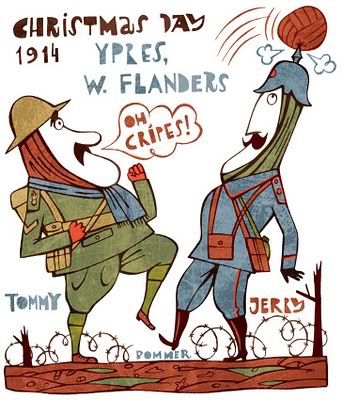
In a program about wartime Christmases broadcast a couple of years ago ago on C-Span, Professor Stanley Weintraub said that prior to Christmas day, a British newspaper had encouraged average citizens to send plum puddings to their loved ones at the front to lift their morale. The British soldiers received so many packages that they didn't know what to do with them. They had more than enough goodies to swap with German soldiers. The Germans had lots of cigars and sausages to offer. It all started when they erected table-top Christmas trees with lit candles in front of their trenches. The British were only a couple of hundred yards away and shot at the German positions. Calmly, the trees were replaced one by one. Eventually the British figured out that this was a genuine gesture of peace. About those football games? Professor Weintraub's research in England showed that the Germans won most of the low-scoring games.
As pointed out in this article written on the 100th anniversary of this event
Five months into World War I, the Christmas spirit took hold in the most unlikely of places—the bloody Western Front. In a series of spontaneous ceasefires, soldiers laid down their arms to sing carols, exchange gifts and even play soccer with the enemy. On the centennial of the Christmas Truce of 1914, look back at the sudden outbreak of peace that brought a brief moment of cheer to a grim war. When dawn broke on Christmas morning, something even more remarkable happened. In sporadic pockets along the 500-mile Western Front, unarmed German and Allied soldiers tentatively emerged from the trenches and cautiously crossed no-man’s-land—the killing fields between the trenches littered with frozen corpses, eviscerated trees and deep craters—to wish each other a Merry Christmas. Political leaders had ignored the call of Pope Benedict XV to cease fighting around Christmas, but soldiers in the trenches decided to stage their own unofficial, spontaneous armistices anyway. Far from an organized, top-down ceasefire, the Christmas Truce instead was a series of small armistices that bubbled up from the men in the foxholes deciding to fraternize with the enemy. “We shook hands, wished each other a Merry Xmas and were soon conversing as if we had known each other for years,” British Corporal John Ferguson wrote of the encounter between his Seaforth Highlanders and German forces. “Here we were laughing and chatting to men whom only a few hours before we were trying to kill!” “Almost always, it was the Germans who at least indirectly invited the truce,” writes Stanley Weintraub in his book "Silent Night: The Story of the World War I Christmas Truce." That was partly because the Germans were winning the war at that point and many of their troops had worked in Great Britain before the war and could speak English.
Stanley Weintraub, Silent Night: The Story of the World War I Christmas Truce (2002). British and German soldiers are pictured above at Ploegsteert Woods during the Christmas Truce.
The War Must Go On
The Christmas truce did not last as high commands on all sides of the conflict disapproved of the unnecessary fraternization between the troops and several steps were taken to avoid a repeat in the years to come. Why did the high commands behave this way? They feared that the outbreak of peace would get contagious and that the war might end. If the war ended, the side which was at a strategic disadvantage would not only be perceived as losing the war, but, importantly, the government in power would almost certainly fall. It wasn't in the interest of the military leaders to let this happen, even as the commanding officers of the troops facing each other had no such desire to reignite hostilities. It wasn't meant to be. Frontline troops were sent to the rear and fresh reserve troops, with no memory or knowledge of the truce, replaced them.
The war had a momentum of its own. Even as the truce lasted in a few instances till New Year's Day, the war started again. Soldiers had no option but to resume the war. Expected by many to end by Christmas 1914, World War I would be fought for almost four more bloody years
The high brass on both sides quickly determined that they could not let the situation develop. In the national interest, the war had to go on. Peace has always been more difficult to make than war, but it was materialising. Under threat of court martial, troops on both sides were ordered to separate and restart hostilities. Reluctantly, they drifted apart. General Sir Horace Smith-Dorrien’s order to II Corps from his cushy rear-area headquarters read: "On no account is intercourse to be allowed between opposing troops. To finish this war quickly we must keep up the fighting spirit." But some units were too contaminated by Christmas to be reliable, and it took a few days to bring in replacements. Both commands ordered rolling artillery barrages to disrupt the stillness and to motivate responses. In most sectors where the shooting had stopped, signals (in some cases, flares) set by their officers called men back to their trenches or confirmed the imminent close of the truce. Private Percy Jones of the Westminster Brigade wrote in his diary: "We parted with much hand-shaking and goodwill." Rifleman George Eade of the 3rd London Rifles said a German soldier told him: "Today we have peace. Tomorrow you fight for your country. I fight for mine. Good luck."
"The Deserter" was an anti-war editorial cartoon by Canadian-American cartoonist Boardman Robinson and depicts a pacifistic Jesus being shot by European soldiers from five countries on both sides of the war. Cartoon credit: Wikipedia.
For a brief period in late December 1914, the guns of war fell silent, the senseless slaughter stopped, and sanity prevailed - even as it could not eventually overcome the all-too-frequent human urge to act irrationally. It was an "amazing spectacle" and a remarkable moment in the history of modern warfare.
I first posted a version of this essay several years ago on DK.

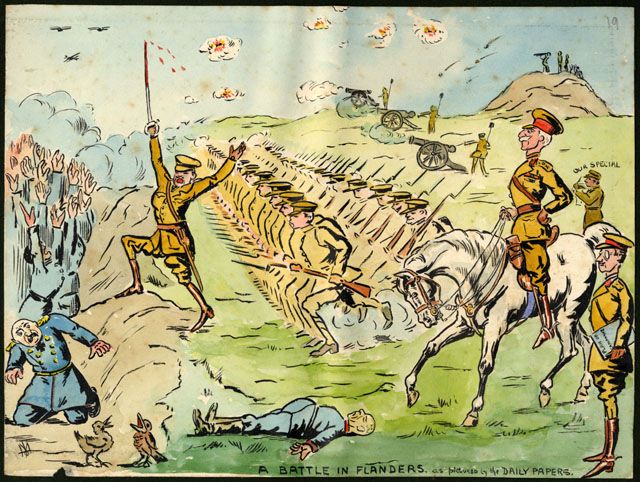
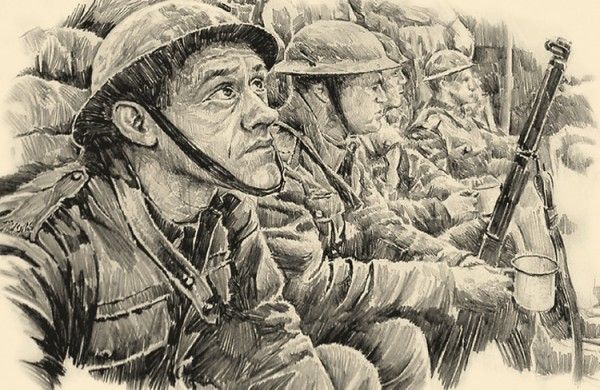
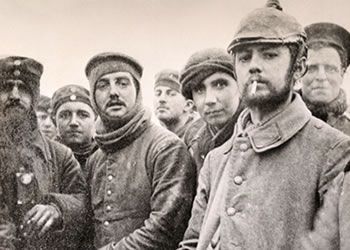
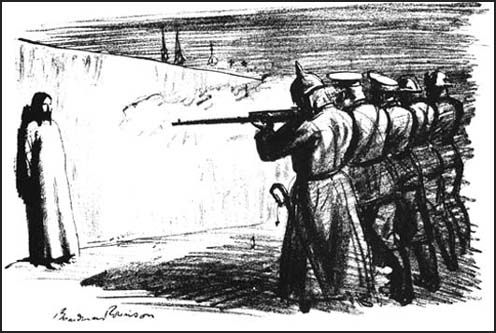

Comments
Two Years Prior to the 100th Anniversary
... of the Christmas Eve Truce, a wonderful opera was commissioned by the Minnesota Opera in 2012. This two-act production centered on French, German, and Scottish soldiers who joined together on December 24, 1914 to celebrate peace, friendship, and humanity of the holiday season.
It is sung in English, German, French, Italian and Latin with English translations.
You can read more about Silent Night, look at the synopsis of the opera, and also watch a series of video clips on YouTube about the Pulitzer Prize-winning production and its origins. "An amazing spectacle" was how Sir Arthur Conan Doyle (of Sherlock Holmes fame) would describe the 1914 Christmas Eve truce. It was, he wrote, "one human episode amid all the atrocities which have stained the memory of the war."
A riddle wrapped in a mystery inside an enigma
A Graphic, Haunting Version of "Dulce Et Decorum Est"
Arguably the greatest war poet of his generation, Wilfred Owen had defiantly mocked the idea that there was honor in dying for one's own country. Ironically, that is exactly what he ended up doing. After a stay at Craiglockhart War Hospital in late 1917, Owen returned to France to rejoin his military unit. One week before the war would end, he was caught in a German machine gun attack and killed in action on November 4, 1918. On the day the war ended on November 11, 1918, the sound of church bells in Shrewsbury, England signaled the coming of the long-awaited peace. At the home of his parents, the doorbell rang and a telegram informed them that Owen had been killed the week before.
A riddle wrapped in a mystery inside an enigma
Thank you, JnH! I think I first learned about this when you
wrote about this over there. I used to think if we put old soldiers in charge of war that would end it, but John McCain proved me wrong.
Please check out Pet Vet Help, consider joining us to help pets, and follow me @ElenaCarlena on Twitter! Thank you.
teach your children well. nt
bygorry
This is the kind of thing
that gives me hope for humanity.
Thank you JnH. Your pieces are like books from a golden age.
So rich in depth and research, so much great reference material and excellent layout that one wants to come back to over and over again. I went back to your piece on Spanish Civil War many times, just as I would a great book, and learned so much. I look forward to reading and re-visiting this one too.
The Wilfred Owen poem is so powerful and needs to be read in all schools throughout the world, especially as a counteract to all the ugly nationalism that lays at the heart of the aggression that leads countries to war. Have you seen the amazing film series called "14 Diaries of the Great War"? One of the best, most moving and stunning films of that catastrophic death trap through depictions of actual letters written by a very diverse collection of regular folks from all over the world and rare footage of life during wartime and on the front lines.
You are a great asset to this community. You were a great asset at TOP too. I also remember how much I looked forward to your excellent collection of political cartoons.
So appreciative to especially have you here, and not there. Thanks again, friend.
"If I should ever die, God forbid, let this be my epitaph:
THE ONLY PROOF HE NEEDED
FOR THE EXISTENCE OF GOD
WAS MUSIC"
- Kurt Vonnegut
Thank You for Your Comments, Mark
I always enjoy writing historical essays as I invariably learn something new about the topic at hand. In the coming year I hope to do more of it even as, at least for the past several months, free time has not been abundantly available to me.
I'm going to watch the diary series you mentioned above as many of the episodes seem to be available on YouTube.
A riddle wrapped in a mystery inside an enigma